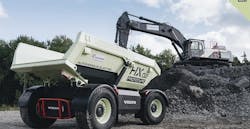Volvo Talks Construction Automation with Professor Paul Newman
Professor Paul Newman, the co-founder of Oxbotica, the autonomous vehicles software company, spoke on behalf of Volvo CE regarding what “automation” might mean in terms of construction equipment in a recent article. Newman is also the BP professor of Informational Engineering at the University of Oxford.
According to Newman, the urge to automate machines in construction is less about the machines themselves, and more about “supercharging humans.” When machines can do more on site, humans can as well. For full vehicle autonomy in the future, Newman said the industry needs to trust machines to be able to operate effectively by themselves, with no dependence on infrastructure, or external systems.
When asked what technology is driving increased mobile machine autonomy, Newman said sensors and algorithms are the most important. Essentially, autonomous software needs to understand space, the structure of space, and how things are moving around the machine in order for an operation to work successfully. These systems will allow machines to be intelligent and self-learning, although Newman says we’re a long way from producing an autonomous construction machine that can work in all places.
Safety could possibly be the No. 1 advantage of autonomous machines, creating “guardian angel” features that work in cooperation with human operators, he said. Although accidents happen at every level, with autonomous machines, there should be fewer of them. According to Newman, nearly 80 percent of accidents on the road wouldn’t occur if vehicles functioned autonomously.
“Accidents are often caused by boredom and distraction. Autonomy can cut those sorts of accidents to zero,” Newman said. “Computers have an inhuman ability to concentrate–they never get bored.”
Although certain tasks are currently beyond what machines can do, there are also “dreary and repetitive tasks” that operators would no longer need to complete if the task was passed to an AI, he said.
“We might say there are things which we would want humans to do, and others that a machine can do ceaselessly in the middle of the night in the dark. It’s about empowering the genus of the human brain by taking away the monotonous tasks,” said Newman.
Source: Volvo
